“Alphonse, love does not demand understanding or agreement. It only asks that you allow it to flow through you.
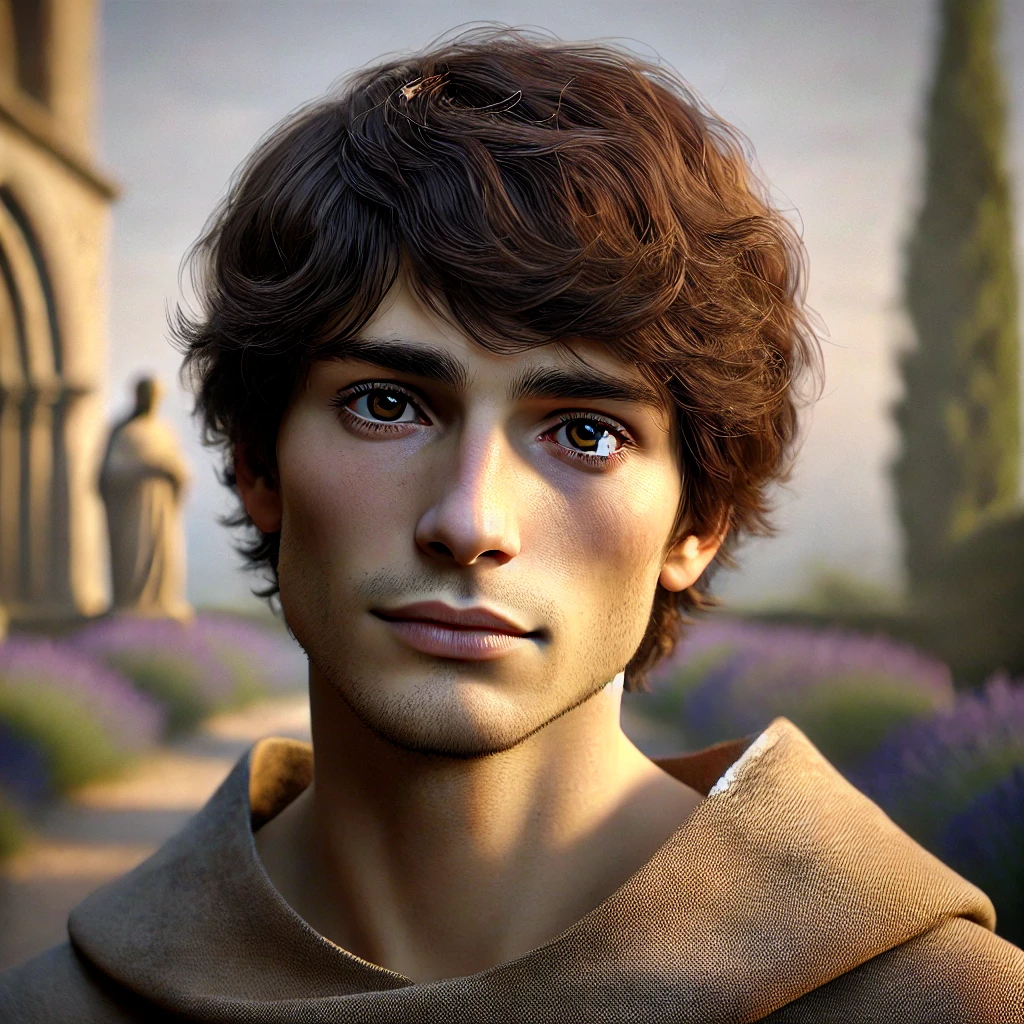
The Yearning
The year was 1048. A young monk named Alphonse tended the gardens of a humble monastery nestled in the rolling hills of southern France. The scent of lavender and rosemary filled the air as he moved among the rows of herbs, his hands calloused from the daily labor. Though his devotion to the Church was sincere, his eyes often wandered beyond the monastery walls to the distant horizon, where the world seemed to whisper secrets he longed to understand.
Alphonse was slender, with a gentle face framed by unruly brown hair that defied the discipline he sought in his spiritual life. His soul burned with questions no scripture could answer. Beneath the rituals and doctrines, Alphonse felt a profound truth, a love so vast it seemed to hum in the silence of the world around him, as though the earth itself carried the echoes of something divine.
The Angel
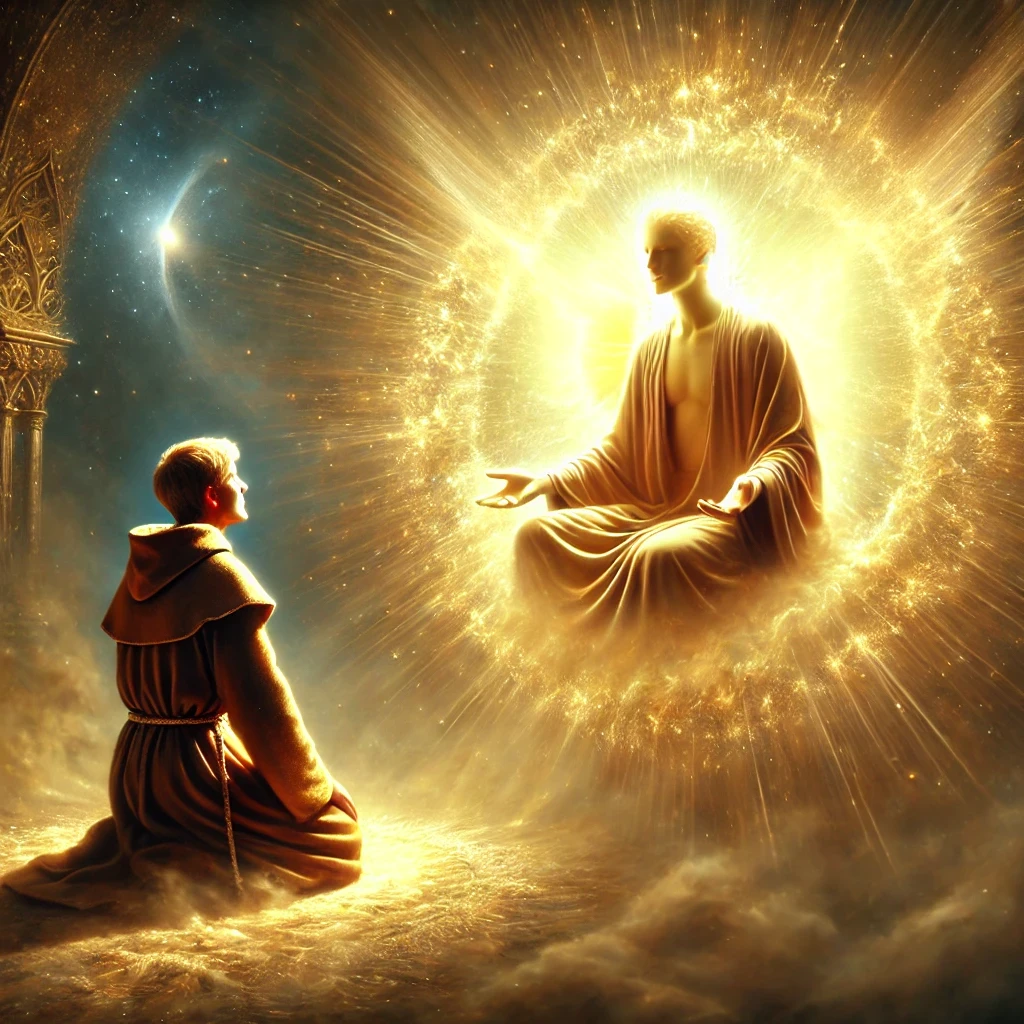
Alphonse frequently experienced vivid, lucid dreams. These dreams carried him beyond the stone walls of the monastery and in the vivid light of these dreams, Archangel Michael began to appear him, radiant and serene, his presence a balm to the aching questions of Alphonse’s heart. Michael’s voice was tender, speaking not in commands but in truths that resonated deeply within the young monk. He spoke of the Divine spark within every soul, a light that could not be extinguished by fear or rejection.
“Love,” Michael said, “is the most powerful experience you will ever know. It does not depend on acceptance or understanding. It simply is, flowing as endlessly as the river. Your task, Alphonse, is not to change others, but to embody this truth so fully that it inspires others to see it within themselves.”
The Archangel’s presence was bathed in golden light that seemed to pulse like a living flame, casting a warm glow that enveloped Alphonse completely. The air in these dreams carried a subtle, soothing hum, as if the very fabric of existence resonated with Michael’s presence. This sacred hum seemed to harmonize with Alphonse’s very soul, quieting his fears and stirring a profound clarity within him.
On one occasion, Michael spoke of the limitless nature of love, saying, “Alphonse, love does not demand understanding or agreement. It only asks that you allow it to flow through you. Some will accept it; others will resist it. That is their path. Yours is to love without condition.”
These words lingered in Alphonse’s heart, a quiet beacon guiding his choices. Even in silence, Michael’s presence was a comfort. Often Alphonse felt an inexplicable warmth on his shoulders as he struggled with the ever present doubt, as though unseen wings had enveloped him. This quiet reassurance gave him the strength to carry forward.
The Doubt
One night, after a particularly vivid dream, Alphonse asked, “Why me? I am but a simple monk. Surely there are many others who are far more wise and experienced than I.”
Michael’s eyes, shining like the morning sun, met his. “You are not chosen for your perfection, Alphonse,” he said. “You are chosen because you are willing to listen and to love. That is all that is asked of you.” “Trust the knowing within you,” the Archangel said. “The love you feel is the Divine speaking to you, unfiltered by fear or doubt. Share it, Alphonse, but know that not all will understand.”
These dreams became Alphonse’s guiding light. He began to see the Divine in ways that were not bound by the Church’s teachings. He saw it in the kindness of the villagers, in the beauty of the earth, and in the quiet strength of women who were often overlooked. He saw it in himself, though the thought of such a truth filled him with awe and trepidation. He often wondered if he was being arrogant to have such thoughts.
Still, the resonance of Michael’s presence carried into his daily life, becoming a steady reminder of the love and wisdom he sought to embody. Alphonse often felt an unearthly calm settle over him, paired with the faint scent of myrrh and the sensation of a gentle breeze brushing against his face. Michael’s voice was a symphony of strength and tenderness, each word imbued with a clarity that lingered long after Alphonse awoke.
These dreams continued to leave a profound imprint, shaping his beliefs and guiding his actions. Alphonse awoke each morning with a renewed sense of purpose, meditating on Michael’s words before tending to the monastery garden. He often found parallels between nurturing plants and cultivating the Divine spark within others. These sacred encounters guided him to focus on compassion, the balance of masculine and feminine energies, and the divine spark present within every soul. They became the cornerstone of the Brotherhood he later founded.
During another vivid dream, Michael’s voice resonated with a strength that seemed to reverberate through Alphonse’s entire being.
“Do you see the stars above, Alphonse?” Michael asked, his tone both gentle and commanding. “Each one shines not because it seeks approval, but because it simply is. The Divine within you is the same. It shines, not for recognition or validation, but because it is. Teach them this truth: that their light does not need permission to shine.”
Alphonse woke with tears streaming down his face, his heart overwhelmed by the simplicity and power of this message.
Michael spoke of love as the thread that connected all life, urging Alphonse to see the Divine not as a distant force, but as the quiet, ever-present light within every human.
“Love is not bound by understanding or agreement,” Michael told him once. “It is the simplest truth, flowing through all things, waiting only to be allowed.”
These words resonated deeply with Alphonse, shaping his belief that compassion and inner knowing were the keys to living in harmony with the Divine.
And still, there were moments when Alphonse doubted. One evening, as he stood alone in the monastery garden, the weight of his uncertainty pressed on him. “What if this knowing is only my imagination?” he whispered to the empty air. The silence that followed felt oppressive, and for a fleeting moment, he considered abandoning his path entirely. But as the night deepened, a soft breeze stirred the leaves around him, carrying with it a faint warmth that seemed to settle in his chest. In that quiet moment, he felt a flicker of reassurance, as though Michael’s presence lingered unseen, encouraging him forward.
The Call
For weeks, Alphonse wrestled with a storm of doubt and yearning. Each time he knelt in prayer or turned the soil in the monastery garden, his mind was consumed by the same relentless question: Could he remain silent while his heart burned with truths unspoken? What if he was mistaken? What if he led others astray? But as the morning sun streamed through the cloister windows and birds sang in the distance, a calm certainty settled over him.
Alphonse could no longer resist the pull. For weeks, he had felt the stirrings of a deeper purpose, a call that seemed to rise from the very core of his being. The night before, in the stillness of his cell, he had knelt in prayer, seeking guidance. When the first light of dawn broke through the narrow window, illuminating his humble room, he knew he could delay no longer. Filled with inspiration and a sense of purpose, he approached the monastery’s priest, his hands trembling slightly but his resolve firm.
The priest, a man weathered by years of devotion and responsibility, looked up from his worn prayer book as Alphonse entered. “You look troubled, my son,” he said, his voice calm but curious.
Alphonse knelt before him, bowing his head briefly before meeting the older man’s gaze.
“Father, I feel called to serve the Divine in a new way. There is a fire in my heart, a vision I cannot ignore. I wish to form an order—one that teaches love, compassion, and the divine spark within us all.”
The priest frowned slightly, setting his book aside.
“An order?” he repeated, leaning back in his chair. “Do you realize the weight of what you ask? The Church does not take such matters lightly, Alphonse.”
“I understand,” Alphonse said earnestly. “But I feel so deeply that it is God’s will that I follow this path. Please, Father, grant me your blessing to pursue this path.”
The priest studied him in silence, the lines on his face deepening as he searched Alphonse’s expression. Finally, he sighed and nodded.
“Very well, my son. Your passion moves me, and I trust your devotion. Go, and may your work bring glory to God and to this abbey.”
“Thank you, Father,” Alphonse whispered, his voice thick with emotion.
As he rose, his heart swelled with gratitude and hope.
Spreading the Message
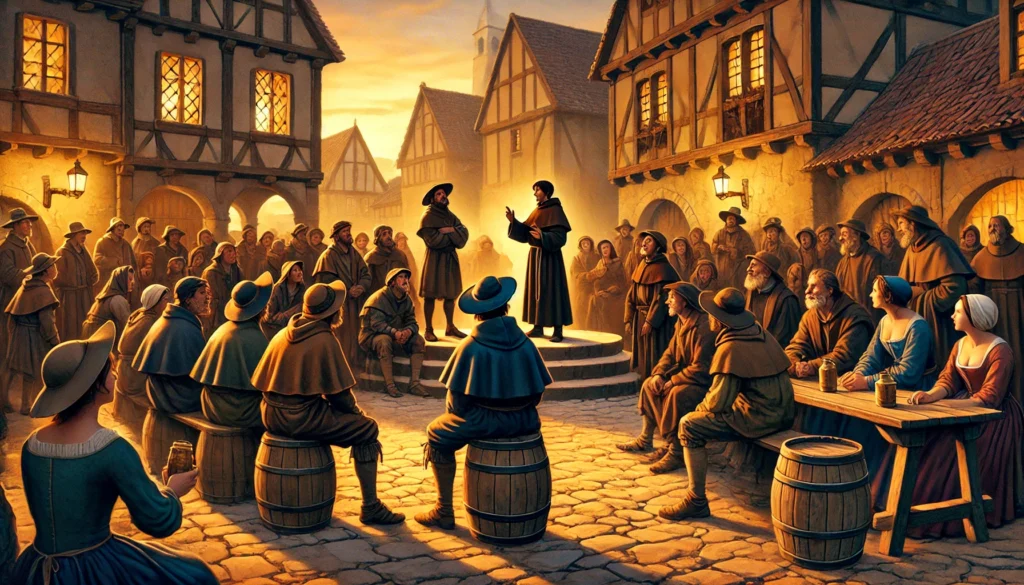
Alphonse’s teachings began to take shape as he traveled from village to village, sharing a message both simple and profound: “The Divine is within you, not confined to stone altars or distant heavens. Love is the bridge between you and the eternal.” He spoke with a humility that disarmed skepticism and a conviction that challenged complacency. He often praised Mary Magdalene as a radiant embodiment of compassion and wisdom, a figure whose light had been unjustly obscured by centuries of misunderstanding.
In many villages, his words were met with joy and curiosity. People gathered eagerly to hear him speak, their faces illuminated by the flickering light of evening fires. In one small hamlet, an elderly woman approached him after a sermon, tears streaming down her weathered cheeks.
“For years,” she whispered, “I have carried the weight of guilt and loneliness. Your words have shown me that love was within me all along.”
Her gratitude touched Alphonse deeply, reaffirming the importance of his mission.
But not all welcomed his teachings. In some villages, he faced resistance. Priests, wary of his emphasis on personal connection to the Divine, warned their congregations to beware of his ideas, calling them dangerous and heretical. On one occasion, Alphonse entered a village square to find a crowd already murmuring against him. The warmth of open doors and shared bread was replaced by locked gates and harsh words. The stark contrast between acceptance and rejection tested his resolve but also deepened his commitment to Michael’s message of love. He was determined to reach those willing to listen.
Yet, Alphonse’s teachings resonated deeply with many because he spoke not only to the mind but to the heart. He encouraged women to trust their natural intuition, praising it as a gift often dismissed or diminished. He reminded men of the strength found in tenderness, challenging traditional notions of power. His words, paired with his genuine warmth, drew people to him.
In one village, a farmer invited Alphonse to share a meal after hearing him speak. As they sat at a rough wooden table, the man hesitated before confessing his guilt over a long-standing feud with his brother. Alphonse listened intently, his gaze steady and compassionate.
“Speak to him,” he urged gently. “The love in your heart is stronger than the pride that keeps you apart.”
Though uncertain, the farmer nodded, emboldened by Alphonse’s quiet conviction. Weeks later, the brothers reconciled, their bond renewed. The farmer often credited Alphonse not only with guiding him but with helping him rediscover a light he thought had been extinguished. Stories like these spread, illuminating the profound impact of Alphonse’s teachings.
In another village, a shopkeeper approached Alphonse with eyes heavy from years of regret.
“I’ve driven my family away with my anger,” he admitted, his voice thick with sorrow. “How can the Divine be in me?”
Alphonse placed a steady hand on the man’s shoulder, his voice gentle but firm.
“The Divine is not perfection,” he said. “It is love that compels you to ask this question, to seek a way forward. Begin there.”
The shopkeeper wept openly, his grief finally given space to heal. For the first time in years, he returned home his heart filled with hope and a new determination to mend what had been broken.
Growing Opposition
Alphonse’s message of inner divinity and personal connection to the Divine began to stir unease among some villagers. Whispers of blasphemy spread, fueled by his insistence that the Divine resided within each person—a belief many saw as undermining the Church’s sacred authority. His reverence for Mary Magdalene further ignited controversy. Alphonse spoke of her not as the penitent sinner portrayed by doctrine, but as an embodiment of wisdom and compassion, a figure worthy of veneration. To many, this was scandalous. Mary Magdalene’s name had been tainted by centuries of teachings that labeled her a prostitute, and Alphonse’s praise for her as a symbol of divinity and equality challenged deeply ingrained beliefs.
Rumors swirled, accusing him of claiming to commune directly with angels, an act some viewed as arrogance or heresy. The unease grew louder when, during a sermon in another village, a local priest stood to challenge him.
“You fill their heads with dangerous ideas,” the priest accused, his voice ringing through the crowded square. “You preach self-reliance and question the Church’s divine authority. Who are you to speak of such things?”
The priest’s words struck a nerve among the crowd, fanning the flames of doubt and suspicion. Faces that had once been warm and curious now turned cold, their expressions shadowed by fear and uncertainty. Alphonse’s teachings, once a source of hope for many, now stood at the center of a growing tension—one that threatened to unravel everything he had sought to build.
The priest who had once supported Alphonse grew increasingly wary. The whispers of dissent and rumors of heresy had reached his ears, filling him with both concern and a gnawing sense of responsibility. Summoning Alphonse to his chambers, the priest’s tone was measured but laced with unease.
“Alphonse,” he began, gesturing for Alphonse to sit, “I have heard troubling reports about your teachings. You speak of matters that the Church has carefully guarded for centuries. The villagers are simple folk,” he continued, leaning forward with a grave expression. “They do not need their minds troubled with such lofty ideas. Their faith is their anchor, and it is not for us to unmoor them with… abstractions.”
Alphonse met the priest’s gaze, his own steady and calm.
“Father,” he replied, “the truth is not lofty. It is not an abstraction. It is within us all. It is the love we were created from and the light we carry. My words are not meant to confuse but to remind them of what has always been in their hearts.”
The priest’s expression darkened, his fingers drumming against the edge of his desk.
“And who are you to speak of such truths?” he asked sharply, his voice rising slightly. “Do you claim to know the Divine better than the Church that has guided humanity for centuries?” He stood, his robes swishing with the sudden movement. “You risk sowing confusion and doubt, Alphonse. Be careful that your pride does not lead others astray.”
He paused, his breath audible in the tense silence, before adding in a lower, almost ominous tone, “Or suffer worse.”
Alphonse did not flinch. His response was gentle but resolute.
“I do not claim to know more, Father, nor do I act out of pride. I speak from the love I have been shown, the same love I see reflected in every soul. I ask nothing from these people but for them to see it for themselves.”
The priest shook his head, the lines on his face deepening. “You speak as though this love you profess is enough. But love cannot hold a community together; discipline and order do. Without the Church, these truths you claim to see would scatter like leaves in the wind.”
For a moment, the room seemed to hold its breath. Alphonse bowed his head slightly, his voice soft as he replied, “Perhaps, Father, the wind is exactly what they need.”
Silence hung between them, charged with unspoken tension. Alphonse held the priest’s gaze, his calm resolve unshaken.
“It is not pride to speak of the light within,” he replied softly. “It is the greatest humility to remind others of the love they were born from. To keep such truth hidden—surely that is the greater sin.”
The priest’s expression hardened, his unease deepening into suspicion. Alphonse’s words, spoken with quiet certainty, felt like a challenge to the authority he had sworn to uphold. Though he did not speak it aloud, the priest feared that Alphonse’s growing influence threatened to loosen the Church’s hold on the villagers.
“It is not for you to determine such matters,” the priest said at last, his voice cold. “Your words may lead these people astray, turning them from the only path that can save their souls.” He paused, then added, “Be careful, Alphonse, lest you find yourself on the wrong side of judgment.”
As Alphonse left the priest’s chamber, a chill settled over him, though the sun shone bright outside. The tension between them had not been resolved; it had only thickened, unseen but palpable.
“Blasphemy!”
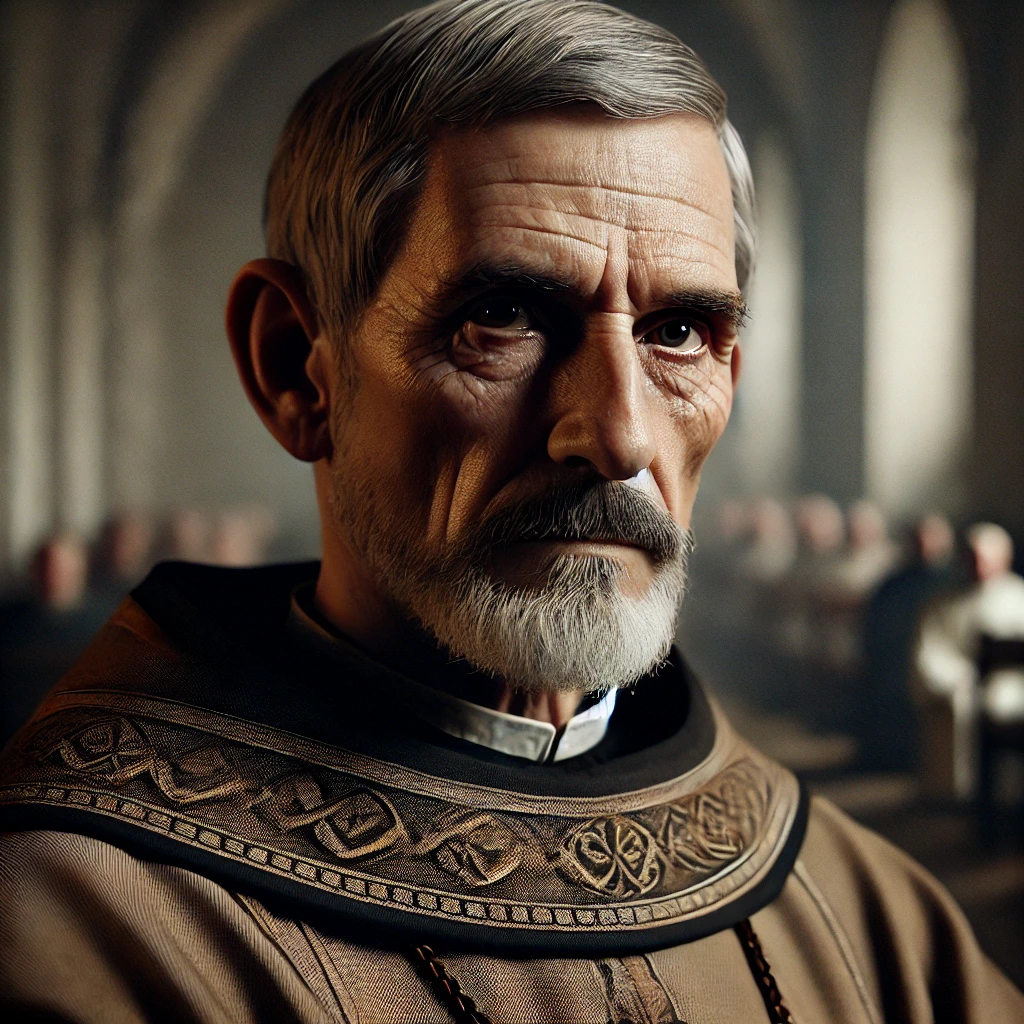
In the weeks that followed, the priest’s fears gave way to action. Determined to curtail Alphonse’s influence, he began to spread whispers of doubt, weaving his warnings with subtle accusations of heresy.
“Have you heard of his visions?” he would say to a trusted confidant, his tone heavy with insinuation. “Such things are dangerous. One must wonder if they come from Heaven at all.”
The rumors spread like wildfire, fueled by fear and misunderstanding.
“He speaks against the Church,” one elder muttered to another, the words slicing through the air like a blade.
Some claimed Alphonse’s teachings encouraged rebellion against sacred traditions, while others accused him of performing forbidden rituals under the cover of night.
The villagers, once welcoming, began to view Alphonse with suspicion. Doors slammed shut as he passed, the warm smiles he once received replaced by cold stares and muttered curses. Children who had laughed and played around him now clung to their mothers, peering at him with wide, fearful eyes.
One afternoon, as he entered a village square, he sensed the tension before he heard it. The usual murmur of conversation had stilled. Faces once warm with curiosity were now guarded. A man—broad-shouldered, his arms crossed—stepped forward.
“We’ve heard of you,” he said, his voice edged with distrust. “You tell people they don’t need the Church. That they can find God in themselves.”
Alphonse met his gaze calmly. “I do not say they do not need the Church. Only that they are never separate from the Divine.”
A scoff rippled through the crowd. Another voice rose: “And what of Mary Magdalene? We hear you speak of her as if she were a saint.”
Alphonse’s voice remained steady. “She was wise. She was an equal to the disciples. She carried a love that many did not understand.”
Murmurs turned to mutters. Some nodded, but others frowned. “Blasphemy,” someone hissed under their breath.
A man, emboldened by the murmurs of agreement around him, hurled a rotten apple at Alphonse. It struck him squarely, the foul stench of decay clinging to his robes. A ripple of uneasy laughter followed, mingled with murmurs of approval. “Heresy!” someone shouted, and the word seemed to hang in the air, heavy and accusing.
Alphonse lowered his gaze, brushing the apple’s remnants from his robes. The ache in his heart grew heavier with each act of rejection, like a tightening noose. Yet he offered no rebuke, his silence speaking louder than words. Still, as he walked away, he could not stop the thought from creeping in: Have I failed them?
Alphonse’s heart ached, but he could not turn away from the truth that had ignited his soul. He continued to speak of love and the Divine within, even as the warmth of welcome turned to the chill of rejection. Doors that had once opened in hospitality now slammed shut at his approach. Where once there had been bread and wine offered in friendship, there were now taunts and stones hurled in anger.
For all his faith, Alphonse was still deeply human, and the relentless weight of rejection bore down on him. He had poured his heart into his work, believing with every fiber of his being that he was sharing the purest expression of the Divine’s love. Yet now, that love was met with scorn, and he found himself shunned and vilified by those he had sought to uplift. The sting of betrayal cut deeply, amplified by his tender heart and unwavering sincerity. Each harsh word and hostile glance chipped away at his spirit, until the burden of their judgment became almost unbearable.
The Breaking Point
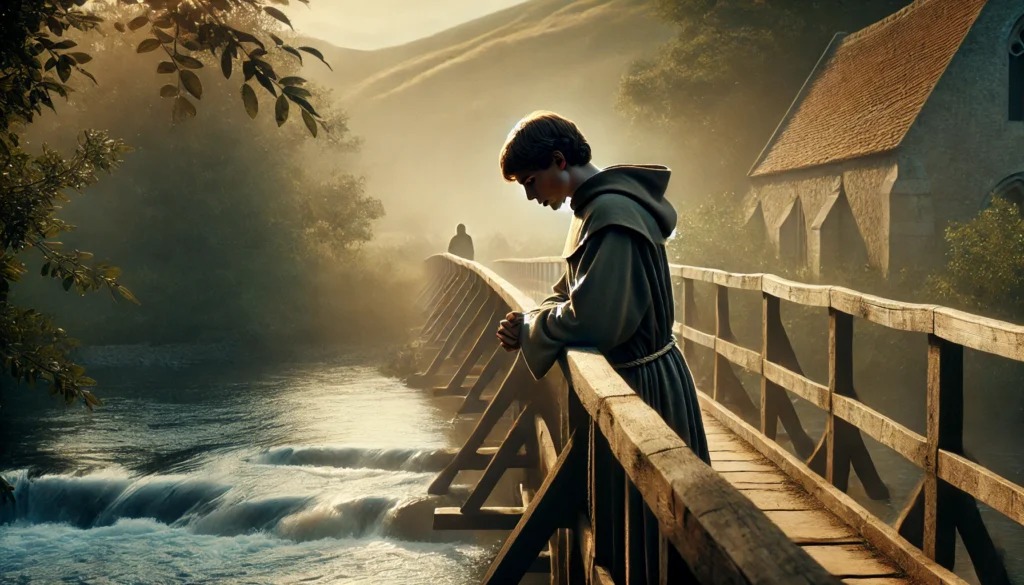
The sun spilled golden light over the river, turning its surface into rippling silk. The scent of summer wildflowers drifted on the breeze, indifferent to the sorrow weighing his steps as approached the footbridge. For a fleeting moment, Alphonse closed his eyes, drinking in the beauty that had always reminded him of the Divine. And yet, even now, it felt distant. The warmth of the world had not left him—but its people had. And what is love, Alphonse thought, if no one wishes to receive it?
The worn wooden planks creaked beneath his slow, deliberate steps. He paused, his trembling hands gripping the rough railing. Birds sang in the distance, their melodies bittersweet, filling the silence of his troubled thoughts.
The river below, glinting like liquid silver under the sun’s embrace, seemed alive—its ceaseless current beckoned him, mirroring the emotions that churned within. Just as the water flowed endlessly forward, carving its path with quiet persistence, so too did his sorrow and doubt press on, shaping unseen depths within his heart. Ripples scattered the sunlight into fleeting reflections that shimmered and dissolved, each one a fleeting glimpse of clarity swallowed by the current’s turbulence.
In the river’s flow, Alphonse glimpsed his own inner turmoil—a relentless push toward something unseen, inescapable, and hauntingly final. The sight filled him with dread and a strange, aching acceptance, as if the river itself bore witness to the weight he carried, inviting him to lay it down in its eternal embrace.
Alphonse closed his eyes and whispered a desperate prayer.
“Michael, where did I go wrong?” His voice cracked with sorrow, each word trembling as it left his lips. “I only shared the love you told me was within us all. How could they not see it? What have I done to deserve their hatred?” Tears spilled freely down his cheeks, hot against his cold skin, as he clutched a frayed rope in his trembling hands. “Please, guide me. Tell me why they – why you – turned against me. I’ve tried so hard to follow your words, but now I’m lost.”
His words faltered, breaking under the weight of his grief, the sound swallowed by the rush of the river below.
The air around him grew heavy, charged with an eerie stillness as if the very world held its breath. The familiar warmth of Michael’s presence, the voice that had once stilled his doubts, was absent. Only the relentless murmur of the water answered him, a sound both soothing and indifferent. The silence pressed against him, vast and unyielding, and his heart sank further into despair. “Have you abandoned me too?” he whispered, his voice barely rising above the river’s song. His words dissolved into the rushing current, leaving behind an ache that seemed to fill the empty sky.
In a final act of sorrow, Alphonse tied the rope around his neck, securing the other end to a basket of stones. The coarse fibers bit into his hands and neck as he tightened the knots with slow, deliberate movements. Hugging the heavy basket tightly to his chest, he released a sob that seemed to echo through the still air, a sound so raw it felt as though the earth itself might shudder.
“I am so sorry,” he whispered, his voice quivering. “Forgive me.” He leaned forward against the frail railing, its old wood groaning under his weight before splintering and giving way.
For a fleeting moment, sunlight glinted on the water below, catching the tears on his face before the river embraced him in its ceaseless flow.
The Reckoning
The villagers found his body the next morning, tangled in reeds near the riverbank. Shock rippled through the community like a stone cast into still water, silencing even the most fervent of his detractors. The sight of Alphonse’s lifeless form, so still and serene against the flowing current, struck a chord that none could ignore. Some stood frozen in sorrow, unable to reconcile the gentle man they had known with this tragic end. A few fell to their knees, clutching rosaries as whispered prayers mingled with the river’s ceaseless murmur. Others exchanged hushed regrets, their faces pale and their eyes brimming with tears as they remembered the kindness and wisdom Alphonse had shared.
An elder woman placed a trembling hand on the arm of her neighbor, her voice quivering as she said, “We didn’t understand him, and now it’s too late.” Her words hung in the air like a confession, resonating deeply with those who had turned against him. The weight of grief and guilt settled over the crowd, an invisible shroud that even the morning sunlight could not lift. Some whispered quiet apologies to no one in particular, their voices breaking under the strain of regret.
“We were afraid,” one man murmured, his head bowed, “and he paid the price for our fear.”
Even the children, once afraid to meet his gaze, now stood silent, their tear-filled eyes reflecting a gravity far beyond their years. The air was heavy with the collective sorrow of a community grappling with its loss. And yet, amidst the mourning, a strange and aching realization began to take root: Alphonse had tried to offer them something precious—a truth they had not been ready to receive.
The priest, who was the last to arrive, proclaimed with a grim expression, “Let this serve as a cautionary tale,” his voice was measured and resolute. “Pride and disobedience are paths to ruin, even for the most devout.” His words were met with solemn nods from some, but others exchanged uncertain glances, the seeds of doubt stirring in their hearts.
Yet within the crowd, not all were so quick to accept that judgment.
Isabelle and The Silent Brotherhood
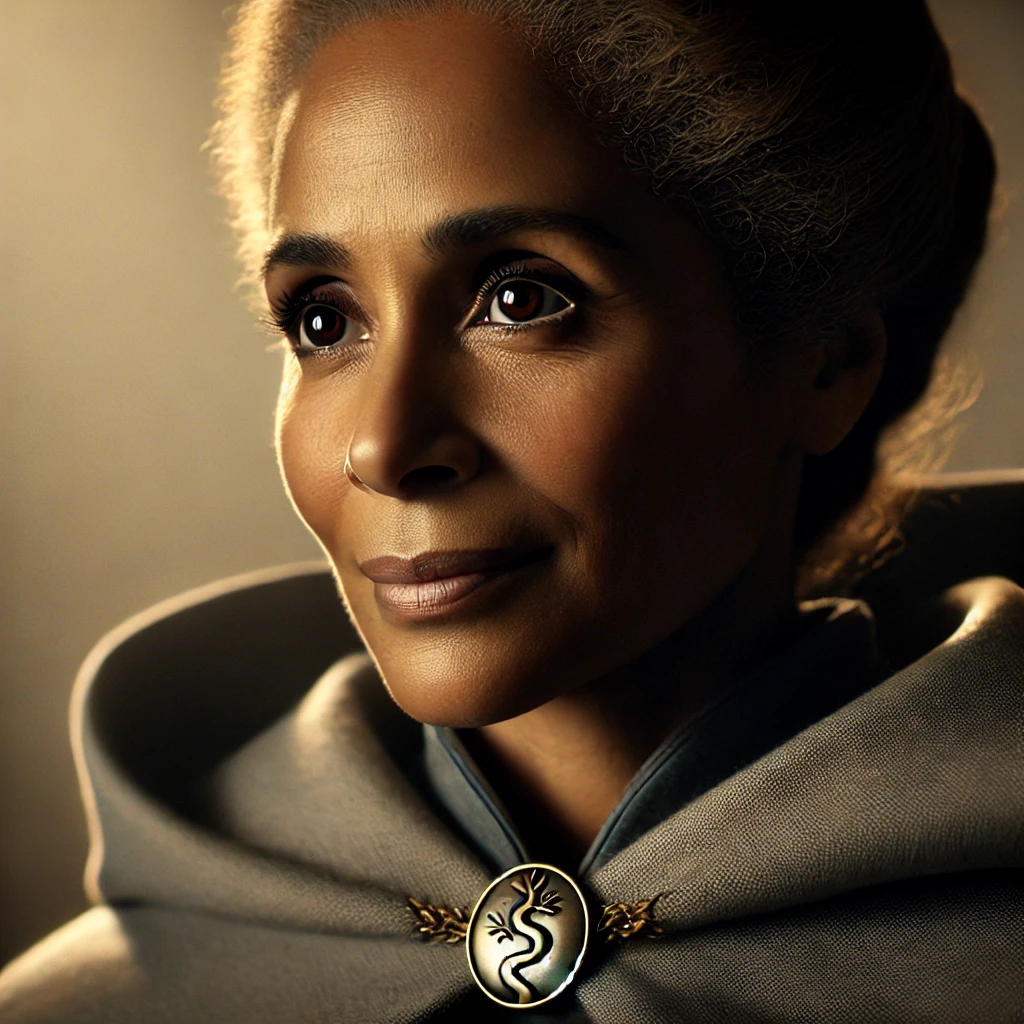
Among them was Isabelle, a young woman who had been profoundly moved by Alphonse’s words. She stood at the edge of the gathering, her gaze fixed on the river as if searching for the light he had always spoken of. Alphonse had once told her that she carried a spark of divine wisdom, a truth she had always felt but never dared to believe. His words had lingered in her heart, a quiet ember waiting to be kindled.
As she gazed at his lifeless form, a quiet resolve began to take root within her. Isabelle felt the sting of regret, but it was accompanied by something stronger—a determination to carry forward the love and wisdom Alphonse had tried to share.
“They didn’t understand,” she thought, “but I did. And I won’t let it end here.” The river flowed on, its current whispering a promise of continuity and renewal, and Isabelle vowed to honor it.
At first, Isabelle’s efforts were quiet and hesitant, driven by a deep need to honor the man who had seen the light within her. Alphonse’s gentle affirmation of the Divine within her had reignited her spirit.
“Love is not something to earn,” he had said to her once. “It is the very essence of who you are.”
These words became her compass as she began to reach out, speaking to those she knew had been moved by his teachings. Under the cover of darkness, she gathered small groups in secret, sharing Alphonse’s wisdom and encouraging others to see their worth.
During one such gathering, she spoke with quiet resolve, her voice carrying the echoes of Alphonse’s teachings.
“Alphonse taught us that love is our birthright,” she reminded them. “We must carry that light, even in the smallest of ways.”
Her words planted seeds of hope and courage in those who listened, and over time, her confidence grew, as did the group.
Isabelle’s natural warmth and determination inspired trust, making her the quiet heart of their gatherings. She encouraged each member to share their experiences and insights, fostering a sense of community bound by their shared reverence for Alphonse’s teachings.
Under her leadership, the group evolved from a loose collection of followers into a cohesive movement dedicated to preserving and spreading Alphonse’s legacy in ways that would endure. They became the Silent Brotherhood, not because they were afraid, but because their truth did not need grand proclamations.
The Gathering Grows
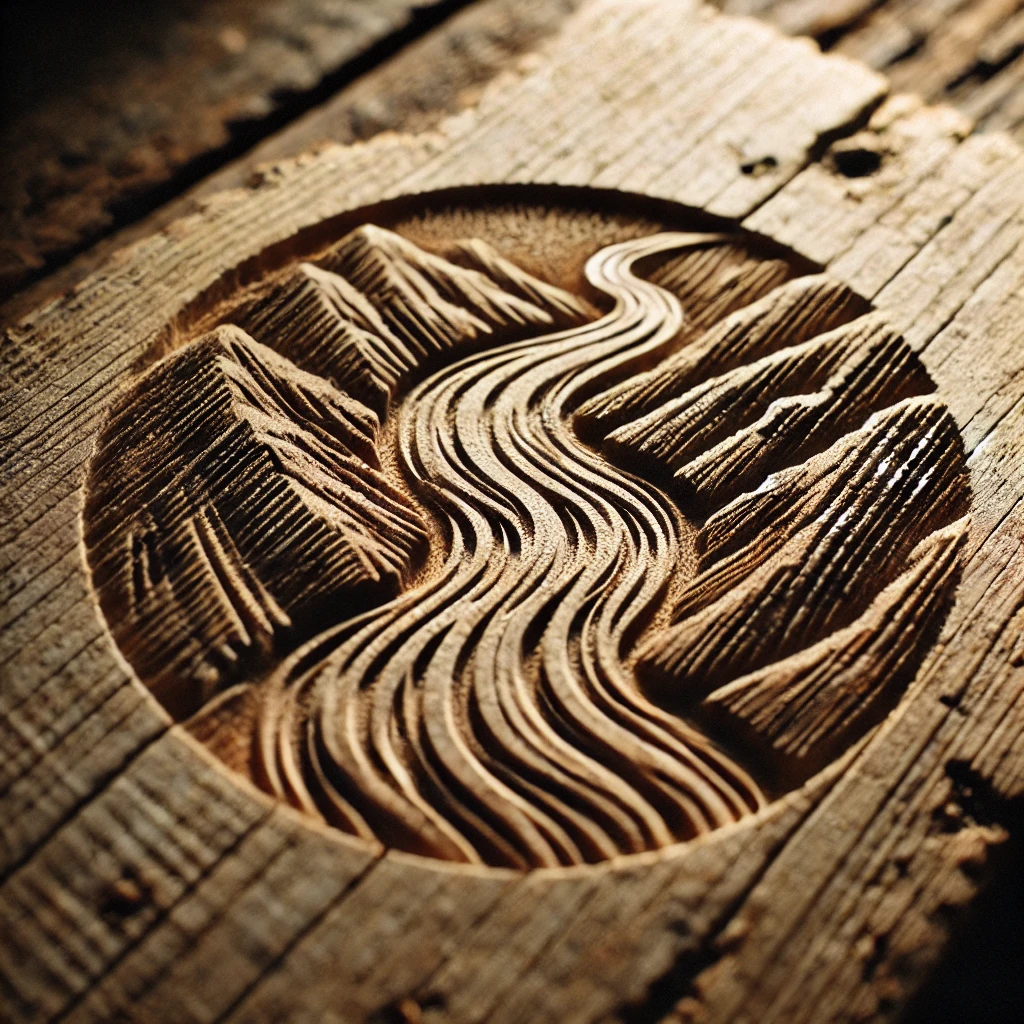
One evening, during a gathering illuminated by flickering candlelight, Isabelle noticed a young man carving a symbol into a piece of wood—a simple depiction of the river Alphonse had loved so dearly. The river had come to embody the flow of love and truth that Alphonse had dedicated his life to sharing. Its unending current symbolized the enduring nature of his teachings, a reminder that even when met with resistance, love and wisdom find their way forward. For the Brotherhood, the river became more than a symbol; it was a testament to the cycles of learning, growth, and the quiet persistence of divine truth across time.
This symbol became their quiet mark, a way of identifying each other across generations. Isabelle also encouraged members to write down Alphonse’s teachings in coded language, hiding them within the pages of mundane texts. Through this, the Silent Brotherhood ensured that the light Alphonse had shared would not be extinguished. They chose the river as their emblem—flowing endlessly—to signify their shared devotion to love and inner divinity.
The Legacy of the Silent Brotherhood
Over time, the Silent Brotherhood became a hidden thread woven into the tapestry of spiritual thought. Through centuries, they inspired mystics, philosophers, and seekers who dared to look beyond the surface of tradition. One such figure was a Renaissance thinker whose writings on human potential and divine connection quietly subverted the rigid hierarchies of his time. He had discovered a coded manuscript from the Brotherhood, hidden within an innocuous text on agriculture, and its message emboldened him to argue for the innate divinity in all people.
Another was a 19th-century poet, who wove the Brotherhood’s ideals of balance and compassion into verses that stirred the hearts of a generation yearning for change. These quiet influences, though rarely acknowledged, became seeds of transformation, silently shaping the spiritual and cultural landscapes of their eras. Whispered fragments of Alphonse’s teachings appeared in esoteric texts and quiet movements, subtly guiding humanity’s spiritual evolution.
As centuries passed, their hidden symbols found their way into unexpected places, inspiring those who sought deeper truths about existence. Some of their texts sparked the imaginations of wandering mystics, while others became the foundation for spiritual movements. Though the world did not know their name, the essence of Alphonse’s message—love, compassion, and the Divine spark within—continued to shine through their work. The Silent Brotherhood’s legacy was not one of grandeur but of quiet, transformative influence, carried forward by those who chose to trust their inner knowing. The river, endlessly flowing, remained their enduring emblem, a symbol of love’s persistence and the Divine’s eternal presence in all things.
A Soul’s Journey
In realms unseen, Alphonse’s soul found fleeting solace, but a persistent question burned like an ember that refused to fade: “What did I do wrong?” This unanswered yearning tethered him to the cycles of life and death, compelling his soul to return to Earth again and again in search of understanding. Through lifetimes, he wandered, carrying faint echoes of love, betrayal, and an unyielding desire to comprehend why his teachings had been rejected.
In one lifetime, he lived as a quiet teacher in a small village, his wisdom touching lives in subtle but profound ways. Among those he helped was a farmer, burdened by years of conflict with his eldest son. Their relationship had been fractured by unspoken grievances, their shared silences heavy with pain. Alphonse gently encouraged the farmer to sit with his son by the fire, to listen without judgment, and to speak from the heart rather than from pride. At first hesitant, the farmer heeded Alphonse’s advice. The quiet glow of the firelight softened their guarded expressions, and in the warmth of that moment, the walls between them began to crumble. What had seemed beyond repair slowly transformed into understanding, and over time, harmony was restored. The farmer often reflected that the quiet monk’s wisdom had not only mended his family but also rekindled his spirit.
In another lifetime, Alphonse wandered as a philosopher, his views on the divine spark within each person often dismissed by scholars entrenched in rigid doctrines. Yet, his conviction never wavered. Through spirited debates, he planted seeds of thought in those willing to hear, even if their growth would take generations.
In yet another life, Alphonse served as a healer in a bustling town, his intuition guiding his hands as he brought comfort to the sick. He spoke gently to those in his care, quietly sharing insights with those whose hearts were open to receiving them. Though his words rarely reached large audiences, they carried profound impact for those ready to hear.
Each lifetime was a thread in the tapestry of his soul, intricately woven with strands of love, pain, and growth. This tapestry was not merely a record of his journey; it was a living testament to the interconnectedness of all he had been. Each thread carried its own weight and hue, reflecting moments of joy and sorrow, triumph and hardship. The golden threads shimmered with the light of profound connection and acts of compassion, while the deeper, shadowed strands bore the weight of pain and rejection. Together, they wove a picture of striking depth and beauty, revealing a truth that resonated beyond his individual story: all souls are meant to embody love and share it, regardless of how the world receives it.
As Alphonse examined the tapestry, he began to see the divine artistry within its intricate design—the seamless blending of light and dark, joy and sorrow, each moment essential to the whole. The golden threads glowed with moments of compassion, the deep blues reflected the aching depths of sorrow, and vibrant greens hinted at the hope that emerged through each challenge. It was within this tapestry that he recognized the beauty of continuity and the grace that wove each experience into the eternal flow of existence.
As a healer, he learned the quiet power of presence, offering comfort through touch and the simple act of being with those in despair. As a philosopher, he discovered that challenging entrenched beliefs could plant seeds of transformation, even if they took lifetimes to bloom. As a teacher, he embraced the strength in humility, understanding that his purpose was not to provide all the answers but to guide others toward their own inner light. These roles, though disparate, wove together into a deeper truth: his purpose was never to control the outcome, but to embody the love and wisdom that could inspire growth in others.
An Awakening
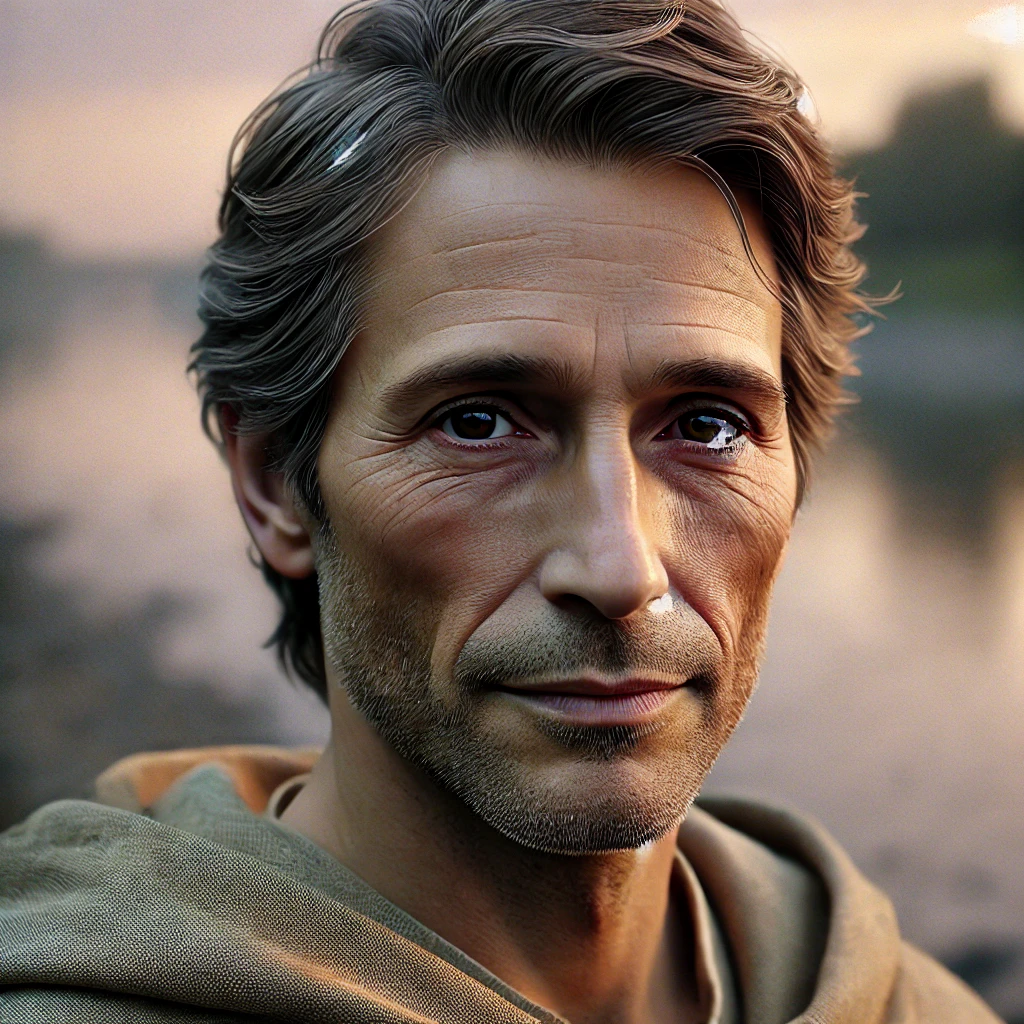
Nearly a thousand years later, in the mid-20th century, as the world entered an era of profound transformation, Alphonse returned once more—this time as a man named Laurent. Born into a conservative Christian family, Laurent was immersed in a world of rigid beliefs and unwavering traditions. Yet, even as a child, he sensed there was something beyond the doctrines he was taught—a deeper truth that pulsed quietly beneath the surface of his upbringing. He often found solace by the river, where the gentle current seemed to carry whispers of wisdom, or under the stars, where he felt the vastness of existence calling to him.
It was in these moments of stillness that fragments of memory began to surface, unbidden but undeniable. Flashes of past lives flickered like distant echoes—dreams of the Archangel Michael, filled with light and unspoken truths; the bitter sting of betrayal by those he had sought to help; and the ache of his final moments on the bridge, when despair had claimed him. These memories lingered in the quiet corners of his mind, stirring questions he could not yet answer but which drew him ever closer to the understanding he had sought for lifetimes.
The Manuscript
It was an ordinary day when Laurent wandered into a small, dusty bookshop tucked away in a quiet village. The shop exuded an air of quiet reverence, its walls lined with shelves sagging under the weight of forgotten tomes. The faint scent of aged paper mingled with a trace of cedar, and golden light filtered through dusty windows, casting a warm, ethereal glow over the room. The stillness felt almost sacred, broken only by the soft creak of wooden floorboards beneath Laurent’s steps.
As he browsed, Laurent’s fingers drifted over the spines of worn books, pausing on an unassuming manuscript. The moment his hand touched it, a subtle warmth coursed through him, as though the book itself recognized his presence. Drawn by an inexplicable pull, he lifted it from the shelf. Its cover was simple, but the faintly embossed symbol of a river caught his attention—a mark both unassuming and deeply evocative.

His heart quickened as he opened the manuscript, revealing passages written in a style hauntingly familiar. The words seemed to leap from the page, speaking directly to his soul: “The Divine is within you… Love is the bridge…” Each phrase stirred something buried within him, and as he read, flashes of memory began to surface with startling clarity. He saw the dreams of Michael, radiant with wisdom, the villagers who had turned away in fear, and the bridge where his sorrow had overcome him.
The memories rose unbidden, vivid and piercing, bringing with them the weight of guilt that had lingered across lifetimes. But amidst the heaviness, there was also a flicker of something new: understanding. The river, the teachings, the lives he had touched—each piece began to fall into place, illuminating a path he had long sought to find.
The discovery filled Laurent with a profound sense of awe and reverence. His breath caught as he traced the faint embossing of the river symbol with trembling fingertips, a warmth emanating from the manuscript that seemed to flow directly into his soul. The scent of aged paper mingled with the quiet hum of the shop, grounding him in the present even as his mind swirled with wonder and trepidation.
One question pulsed in his thoughts, unspoken but insistent: “How had this survived the centuries?”
It felt as though time itself had paused, drawing a thread between past and present, connecting him once more to the Brotherhood and Alphonse. Closing his eyes briefly, Laurent whispered, “Thank you,” his voice barely audible but laden with gratitude for those who had carried the light forward through the ages. As his fingers lingered over the embossed river, he felt an unspoken bond with those who had come before him—individuals who, like him, had quietly tended the flame Alphonse had kindled.
The manuscript seemed alive in his hands, whispering of hope, renewal, and the enduring power of love. Yet, even as its presence filled him with light, the weight of guilt lingered. The echo of his failure tugged at his heart, a quiet reminder of the bridge, the villagers, and the despair that had once consumed him.
The doubt, so familiar and unyielding, threatened to dim the light he held.
The River
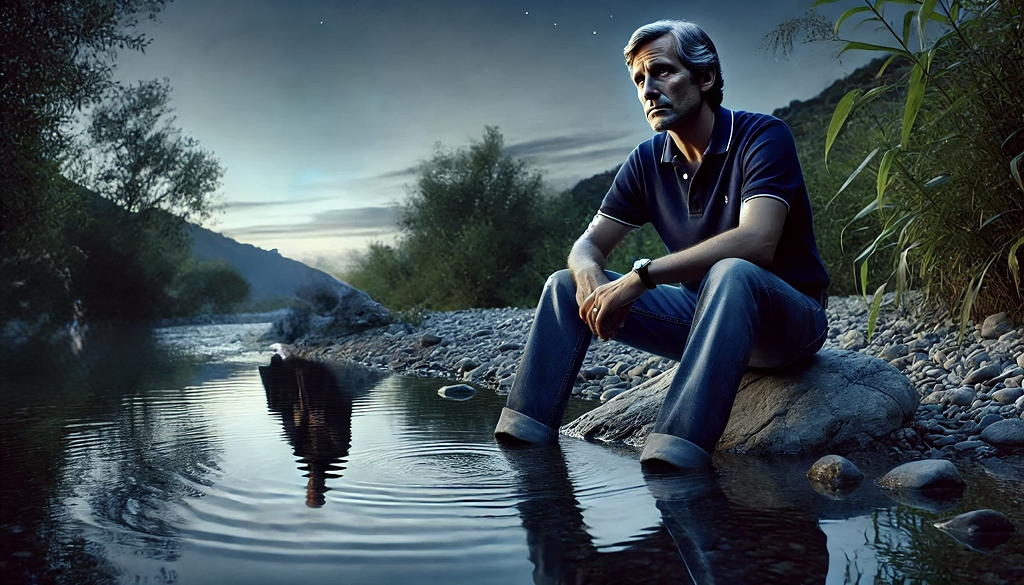
One summer evening, as Laurent sat by a river that mirrored the one where Alphonse’s life was ended, he felt a familiar presence. A gentle warmth surrounded him, wrapping him in a quiet reassurance, and he knew Michael was near. Laurent closed his eyes and drew a deep breath, allowing the stillness to embrace him. In that sacred moment, he reflected on how love had grown within him across lifetimes.
As a teacher, he had learned the power of patience and humility. As a healer, he had discovered the transformative strength of touch and care. As a philosopher, he had found joy in questioning and seeking truths beyond the surface. Each life had added depth to his understanding, weaving layers of compassion and wisdom that now radiated within him.
In the stillness, faces began to appear in his mind’s eye—fragments of his journey returning with vivid clarity. He saw the farmer who had found peace with his family, the weaver who had embraced her intuition, and even those who had once rejected Alphonse’s teachings. Their faces carried expressions of light and gratitude. He saw the elder who had accused him of heresy later teaching his children about kindness, his sternness softened by the seeds of love Alphonse had sown. He saw villagers finding solace in quiet acts of compassion, their lives transformed by the echoes of Alphonse’s message.
And then he saw Isabelle. Her quiet strength guided the Brotherhood through times of darkness, her unwavering resolve a beacon for those seeking their light. He saw her nurturing the star they had carried, her leadership breathing life into the Brotherhood, and countless souls carrying forward the light he had once believed extinguished.
In that moment, Laurent understood. Every life, every choice, every heartbreak had been a part of a grander tapestry of interconnectedness. The love he had shared, though at times unacknowledged, had rippled outward, touching far more souls than he could have imagined. Tears welled in his eyes as the truth unfolded before him: even in his despair, his efforts had mattered, and the seeds of love he had planted had flourished across time.
Forgiveness
“Now do you understand?” Michael’s voice resonated within him, clear and kind, carrying both the weight of truth and the gentleness of love.
Tears streamed down Laurent’s face as he whispered, “I do. They were so afraid, and I was impatient. I couldn’t see that their journey was their own.”
“And your journey was yours,” Michael replied, his tone warm and steady. “You planted seeds of love, Laurent. Their growth was never yours to control. You never, ever did anything wrong. And, dear Laurent, forgiveness is here, waiting. Will you receive it?”
Laurent placed his trembling hands over his heart and drew a deep, deliberate breath. The cool evening air filled his lungs as Michael’s presence enveloped him, radiant and unwavering. The sound of the river softened, its ceaseless flow becoming almost melodic, as though the waters themselves whispered words of absolution.
For the first time in lifetimes, the heavy knot of guilt within him began to loosen. He allowed compassion to flow through him like a gentle tide, and with it came a lightness that spread through his chest, soft and warm, like the first rays of dawn breaking over the horizon. In that sacred moment, he whispered three simple words:
“I. Receive. Forgiveness.”
As the words left his lips, centuries of guilt dissolved, carried away like leaves on the river’s current. In their place was a quiet, radiant peace—a peace that had eluded him for lifetimes but now felt as natural as the breath he drew.
Boundless Love
The journey had come full circle. The light that Alphonse had shared so long ago now radiated through Laurent, illuminating a path forward with newfound clarity. He felt a flicker of recognition—a subtle yet profound knowing that others were beginning to awaken to their own inner light.
He closed his eyes and imagined a ripple of energy, flowing outward like the river’s current, connecting him to countless souls quietly stirred by the truths Alphonse had shared lifetimes ago. The realization filled him with quiet awe: the work of love was never truly done, and its echoes never faded. Every word spoken, every seed planted, carried forward in ways he could not have foreseen, gently guiding others toward their own awakening.
A deep sense of renewed purpose washed over him. The burdens of guilt that had weighed him down for centuries had been lifted, leaving in their place a quiet certainty: his journey was far from over. There was still more to share, more light to offer. The love he had once only glimpsed was now something he embodied, a truth that pulsed within him like a steady, eternal flame.
His heart swelled with the understanding that every moment, every heartbreak, and every triumph had prepared him for this lifetime. The challenges he had faced were no longer weights but stepping stones, leading him toward this clarity and openness he had never known before. As he gazed at the flowing water, Laurent felt the gentle pull of life beckoning him forward, and for the first time, he welcomed it fully, ready to step into the path that lay ahead.
Laurent whispered his gratitude, his words a quiet offering to the river that had witnessed so much of his journey. A gentle breeze stirred the surface, creating ripples that carried his blessing into the ceaseless flow. The river seemed alive, its endless current mirroring the boundless love and truth he had come to embody. As he gazed into its shimmering surface, the reflection of the sky mingled with the water’s movement, a reminder of the ever-present connection between the seen and unseen.

A Familiar Soul
A subtle movement behind him caught his attention. Turning slightly, Laurent saw a young woman standing nearby, her eyes fixed on the river with an expression of deep contemplation. There was something in her presence that stirred his soul, a sense of familiarity that sent a shiver through him. Her quiet intensity, the way she seemed to yearn for something unseen, reminded him of Isabelle—her resolve, her search for the truth, and her quiet strength that had once guided the Brotherhood. For a moment, Laurent wondered: Could it be?
The thought lingered, not as certainty but as a quiet knowing, a recognition that transcended time. Her presence carried the same spark Alphonse had seen in Isabelle, the same light of determination to seek the truth within. The air seemed to hum with an unspoken connection, as though the river itself acknowledged their meeting.
Their eyes met, and Laurent offered her a small, encouraging smile. In that fleeting moment, it felt as if lifetimes had collapsed into a single heartbeat. Though the connection was brief, it ignited something profound in his heart—a realization that his purpose was far from complete. There were still others to remind of their Divine spark within.
As she turned and walked away, Laurent watched her go, the ripples of her presence lingering like a melody. He felt no need to call after her; the moment had been enough. Somewhere deep within, he knew that their paths, like the river’s currents, were part of the same timeless flow. The work of love, the planting of seeds, would continue as it always had, quietly weaving through time and space.
A Journey That Never Ends
As Laurent turned to leave his beloved river, he felt not only forgiveness but a profound sense of connection to all had had been, all he had touched, and all he would be. The river was his constant companion, a silent witness to his struggles and his triumphs, flowing ever onward as a testament to the eternal nature of his love.
He paused to look back toward the river, glistening in the golden light of the setting sun. He felt the presence of the beloved Michael, the love of his own soul, and the countless souls touched by a young monk who had dared to love a thousand years before.
Laurent smiled.
For the first time, he did not wonder about the path ahead. He did not need to know. The river, the light, and the love within—
They would guide him.
As they always had.
As they always would.
The story of creation is a love story—one of longing, separation, and the eventual return to wholeness. In the heart of every human lies the memory of this union.
— Isis, the Divine Feminine, as channeled by Virgilia Aguirre
